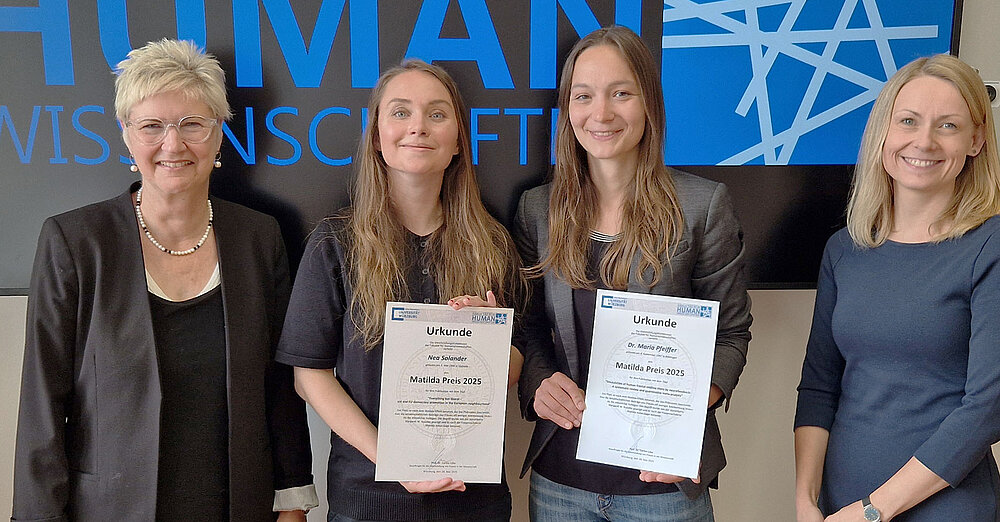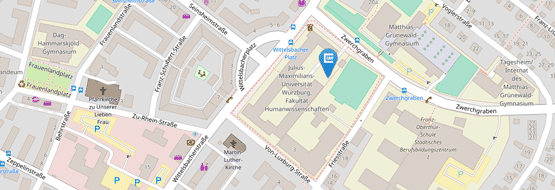Matilda-Award
The Gender Equality Commission of the Faculty of Human Sciences gives two awards for female junior researchers of this Faculty. The wide range of academic disciplines within the Faculty will be taken into account in the selection process.
The award is designed to advance the careers of female junior researchers as well as female doctoral and Habilitation candidates at the Faculty of Human Sciences.
The cash prize of €1,000 may be used for research activities.
Nominations will be evaluated according to originality and scientific contribution to the respective field of study.
The name refers to the Matilda effect, which describes the phenomenon that the scientific contributions of women are often less recognised than those of their male colleagues. The term was coined by the historian Margaret W. Rossiter and is named after the women's rights activist Matilda Joslyn Gage. This effect means that women in science are often overlooked, or their achievements are attributed to men.
Call for applications for the Matilda-Award presented by the Gender Equality Commission of the Faculty of Human Sciences
The Gender Equality Commission of the Faculty of Human Sciences will give two Best Paper Awards for female junior researchers at this Faculty. Each award comes with a cash prize of €1,000. The wide range of academic disciplines within the Faculty will be taken into account in the selection process. For the sixth year the Matilda-Award 2025 is designed to advance the careers of female junior researchers as well as female doctoral and Habilitation candidates at the Faculty of Human Sciences.
Contributions can be submitted in scientifically relevant publication media of the respective disciplines (e.g., journal articles, contributions to edited volumes) that have been published by early-career researchers as first authors and affiliated with JMU as specified. Selection for the award will be based on the originality of the paper and its impact on the discipline in question as well as on diversity and excellence of research at the Faculty of Human Sciences, i.e. impact factor alone is not decisive. To be eligible for the award papers must have been published in 2024 or later. Papers that have been accepted for publication are also eligible.
The selection process by the Faculty’s Gender Equality Commission will take place in the summer semester 2025 and will strive to take into account the research and publication culture in all scientific disciplines at this Faculty. Awardees will be notified as soon as their selection for the award has received approval from the Dean. The prize money may be spent on research activities according to the funding guidelines of the University of Würzburg (conference attendance, research subject fees, student tutors etc.).
Application requirements:
- The nominated paper
- Information about the paper (2 pages max.) stating
- relevance of the journal or edited volume (e.g., peer review, impact factor),
- which contribution the applicant has made in the case of two or more authors:
- how the paper impacts and advances the applicant’s field of research,
- the paper’s impact beyond the discipline in question,
- allocate the paper to its scientific study category (e.g., quantitative research, qualitative research, literature reviews, hermeneutic approach).
- Intended use of the prize money
- Proof that the applicant’s employment contract with the University of Würzburg will end no earlier than the expenditure of the prize money
Please email your complete application as a single file PDF document to gleichstellung.hw@uni-wuerzburg.de. The closing date for applications is 18 March 2025.
Sincerely,
Prof. Dr. Verena Haun
(Women’s Representative of the Faculty of Human Sciences) on behalf of the Faculty’s Gender Equality Commission

Dr. Maria Pfeiffer
Dr. Maria Pfeiffer receives the award for the paper “Modulation of human frontal midline theta by neurofeedback: A systematic review and quantitative meta-analysis”.
The paper provides a systematic review and meta-analysis of the modulation of frontal midline theta (FMT) by neurofeedback. This is a technique that can be used to learn how to regulate one's own brain activity by processing real-time feedback. Based on the findings, the author proposed guidelines for the design and reporting of future (FMT) neurofeedback studies. In addition, a nomenclature was introduced to differentiate the effectiveness of neurofeedback. This should ensure greater clarity in reporting and facilitate future reviews.
Nea Solander
Nea Solander from the Chair of International Relations and European Studies at the IPS is being honored for her academic article “Everything but liberal - aid and EU democracy promotion in the European neighbourhood”.
This paper presents novel findings on the democratizing impact of EU democracy promotion in its immediate neighbourhood. It offers new insights not only into whether the EU can entice democratization, but also into which specific dimensions of democracy are most influenced by its strategies. The study deepens the academic debate on the EU as a global democracy promoter and provides a rigorous explanation of why it succeeds to promote various democracy types over others.
| Year | Awardee | ||
|---|---|---|---|
| 2025 | Dr. Maria Pfeiffer (Psychology) | ||
| Nea Solander (International Relations and European Studies) | |||
| 2024 | Franzisca Maas (Psychological Ergonomics) | ||
| Dr. Wienke Wannagat (Psychology) | |||
| 2023 | Tanja Messingschlager (Psychology of Communication and New Media) | ||
| Sara Wolf (Psychological Ergonomics) | |||
| 2022 | Dr. Catharina Tibken (Psychology) | ||
| Dr. Sonja Schierbaum (Philosophy) | |||
| 2021 | Lea Goldan (Quantitative Methods of Empirical Social Research) | ||
| Dr. Ann-Kristin Herget (Media and Business Communication) | |||
| 2017 | Anja Kürzinger (School Pedagogy/Primary Education) | ||
| Dr. Kristina Suchotzki (Psychology) | |||
| Jennifer Tiede (School Pedagogy) | |||
| Year | Awardee |




